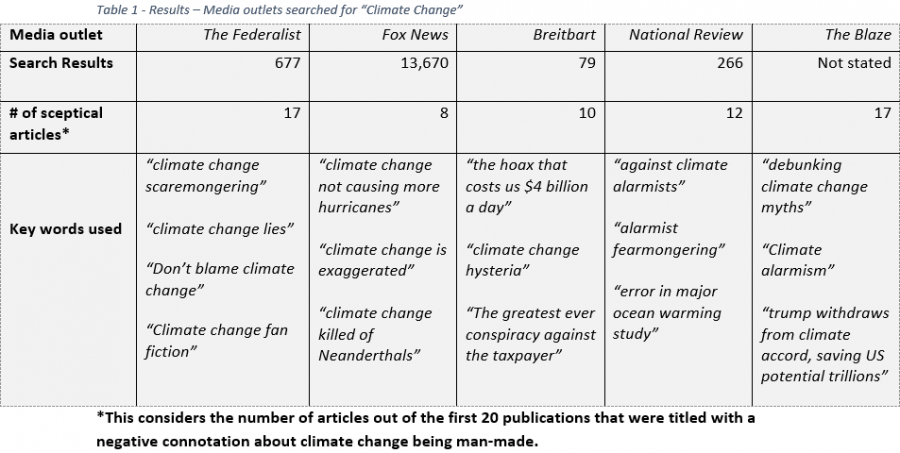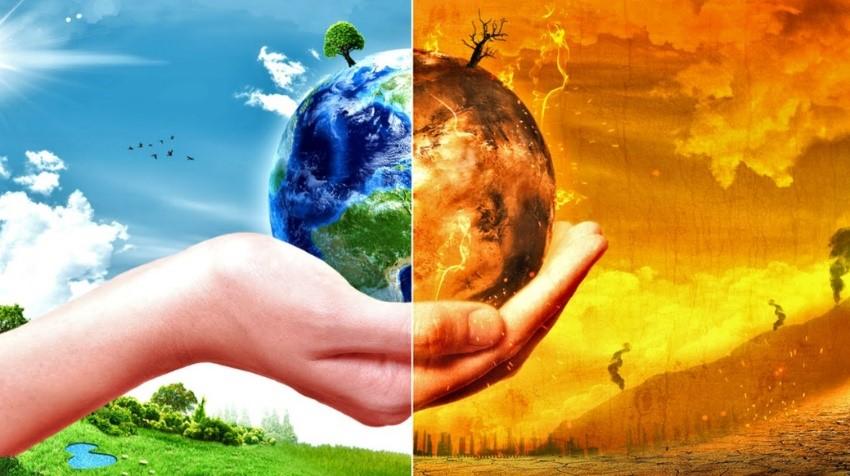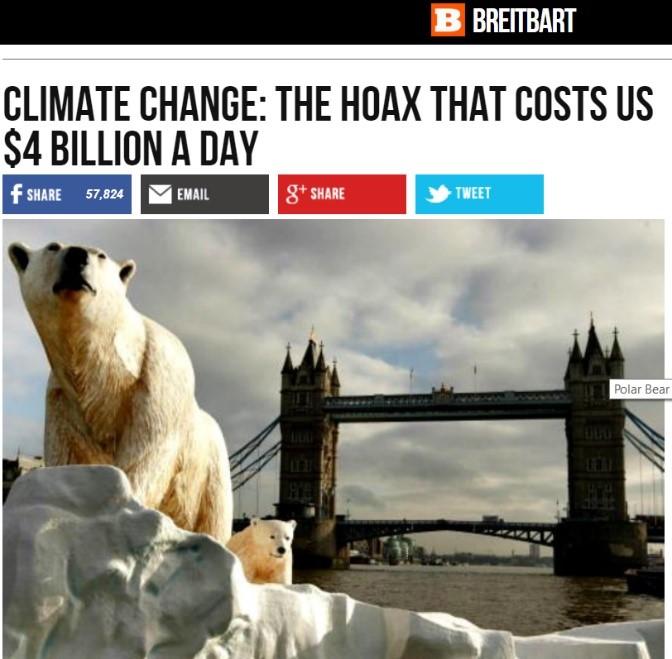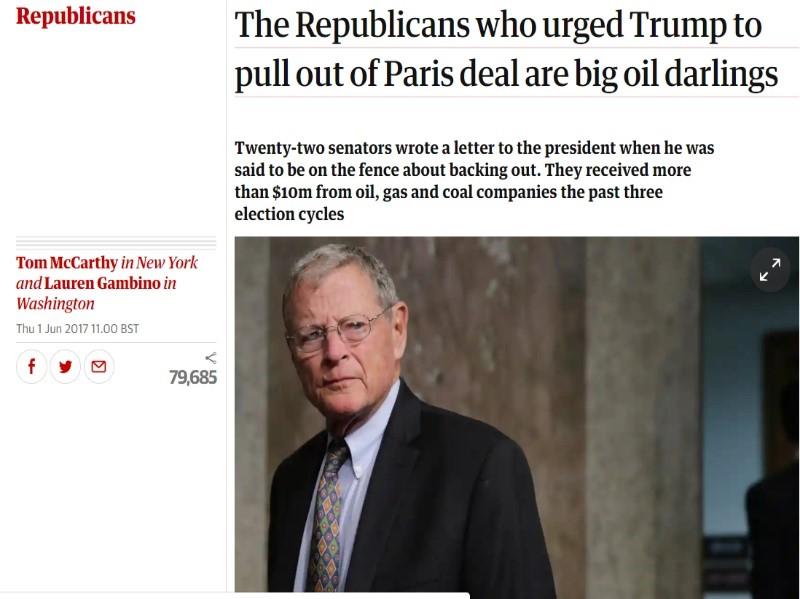
Climate change and its denial by right-wing media
In recent years the world has witnessed a resurgence of an increasingly divisive form of right-wing politics. At the beginning of this year, Brazil inaugurated Jair Bolsonaro as its president, a far-right nationalist, who successfully managed to grasp power in a country which for decades had been under socialist control. This is the latest example in a string of countries where voters have opted for far right-leaning candidates.
The New Right politics of denying climate change
Looking closer to the West, we remind ourselves that in the last few years various nationalist movements have developed into forces to be taken seriously, commanding an ever-increasing portion of the voting populace. Nationalist parties across Europe are gaining support from their respective populace by spreading the message of the masses versus the elite and presenting themselves as the saviors of the common people, who until now have supposedly had no input in the state of their country. In this sense they have successfully garnered millions of supporters across the continent.
The debate often centers around the EU as the manifestation of the elite, which attempts to subvert the democratic power of individual countries and their ordinary citizens, imposing immigration laws which member states must adhere to.
In the 2016 president election campaign in the USA, Donald Trump often cited a corrupt political swamp which only he would be able to change, having never served in politics, and in effect being an outsider to the establishment. While he never used any sort of explicit policy directive to attract voters, it was the notion that he would come through and tackle the elite government and give the power back to the people which eventually contributed to his victory. The result of this shift is the increasing polarization of the political spectrum.
This is compounded by the effects of the current digital era. As read in Ico Maly’s case study of the Flemish identitarian movement Schild & Vrienden - “Today, digital media function as infrastructures that enable and structure global networked activist movements.” (Maly, 2018) The result of this is that it makes any and all information rapidly available, with an unfortunate drawback - an even more divisive society.
This polarization extends into matters which should be inherently apolitical, such as climate change. In looking at this matter we will investigate the rhetoric behind climate change, and how it has resurfaced to the forefront of political debate. The purpose of this article will be an analysis of the rhetoric by right-wing media outlets in the USA on the denial of climate change as a human-made problem.
Global Transformation
It is no secret that president Trump has publicly questioned the validity of the climate change assessment. In responding to reporters’ questions about the latest climate change report, Trump simply said “I don’t believe it.” (Nuccitelli, 2018) In a further testament to the belief of the current administration, the acting administrator of the EPA (Environmental Protection Agency) of the USA is Andrew Wheeler, a former coal lobbyist, now responsible for enforcing clean air and water policies. On top of that, the former administrator, Scott Pruitt, was quoted as having received more than $200,000 from campaign donations from the fossil fuel industry, during his campaign for Oklahoma Attorney General (Wolfson, 2018).
This article won’t delve too far into the accuracy of climate change. However, it suffices to say that the scientific community (which is our best bet for making assumptions related to the natural order of things) overwhelmingly agrees that the evidence clearly indicates that climate change is rapidly increasing, and that human activity in the form of greenhouse gas emissions can be pinpointed as the leading cause.
The political economy and climate change
One assumes that all humans should and would be concerned for the state of the planet we leave for ourselves, and for future generations, and that there should be unanimous cooperation aimed at tackling the issue. Unfortunately, the problem is more complex than that.
Tackling climate change involves spending a lot of money on building new infrastructure, improving technology and introducing carbon taxes, which the average person will have to pay for. Alongside this, countries will have to adapt. “Adaptation, according to the Intergovernmental Panel on Climate Change (IPCC), is the reduction of vulnerability to climate change. Adaptation involves protecting our coasts, cities, water supply, food supply, public health, ecosystems and infrastructure.” (Javeline, 2014) As such, addressing the threat requires more than a change of daily habits, and plans must be implemented which require funding, and thus may not be so popular at times.
This was most recently the case in France, where the gilets jaunes/yellow vest protesters took to the streets of Paris and other major cities to show their discontent with the planned carbon tax implemented by Macron’s government. While the protests were also seen as a revolt against the one percent, the direct cause was the introduction of these fuel taxes. As such, implementing policies to address climate change may not enjoy unanimous support from the people.
Understanding the complexity of this issue allows us to look at it from a broader spectrum. While there is undoubtedly a fair share of people sceptical about the evidence laying the blame on humans, there are many out there who may not support the policies and claims simply because it affects their livelihood, and not because they choose to be sceptical. In looking at it this way, we can start to understand that there are probably many people out there inclined to believe the reports refuting the human induced climate change, as it gives them a strong position to counter the implementation of policies they feel would put them at greater risk.
Right wing denial of Climate change
As stated before, the objective of this article is to analyse the rhetoric used by right-wing media outlets in the USA and the tendency to deny climate change as a man-made problem. The analysis consisted of a systematic search of 5 well-known conservative outlets. The articles were chosen from a website citing conservative websites in the United States (The New Revere, 2018, November 09).
Each outlet was searched using the term “climate change”. For each outlet, the 20 most recent publications were selected, and the numbered proportion of articles deemed negatively addressing climate change was noted. Furthermore, recurring key words were noted down and act as indicators of the kind of rhetoric used by each of the respective media outlets. Table 1 indicates the results of this search.

Table 1 - Results - Media outlets searched for "Climate Change"
The table shows the extent to which the topic of climate change is discussed on conservative websites. Granted, some of the outlets are considered more right-leaning than others, and some are more widely read than others, and in this respect they may not all share the same viewpoint or argue their positions equally (Hence the difference in proportion of sceptical articles).
However, all the listed outlets demonstrated a large proportion of the first 20 articles being written in a way that challenged climate change as a tactic of invoking fear in the people. It portrays climate change as “scaremongering” and leans on the notion that it will cost the American taxpayer billions (or trillions) to buy into the hoax that is all but fan fiction, a conspiracy if you will. In analysing these statements, we bring into focus Jan Blommaert’s conceptualization of the social nature of discourse: “Discourse is what transforms our environment into a socially and culturally meaningful one. But this kind of meaning-construction does not develop in vacuo, it does so under rather strict conditions that are both linguistic and sociocultural, and this set of conditions cannot be exploited by everyone in the same way.This is where social differences in discourse structure and usage emerge as a problem.” (Blommaert, 2005)
The use of these emotion-laden words in the articles concerning climate change are what further polarizes the society which Blommaert discusses. Blommaert essentially refers to his example as related to people’s different perception of the terms “mountain” and beautiful”, the latter of which is subject to interpretation, whereas the first is not, thereby the problem of discourse usage.
Climate Change - Breitbart
In looking at the usage of specific words on conservative outlets, we see a resurgence of terms that essentially invoke fear into the hearts and minds of the reader, all the while insinuating that it is the opposite side attempting to scare the people into buying into the “climate change hoax”. This fear invoked by Breitbart can partly be found in warning Americans how much money it will cost them to address this unimportant problem.
But, more evidently, the fear is more prevalent in other articles by the same media outlets, whereby they stress an imposing doom if they don’t construct a border wall to keep out a supposedly invasive force of migrants intent on murdering and raping Americans. A conflict of discourse structure ensues, whereby the opposite side is accused of being alarmists and fearmongers on one topic, while the accusers themselves are fuelling fears on another subject, hurting their credibility as the weight of their words have little significance.
Looking at Table 1, we notice that The Blaze and The Federalist had 17 out of 20 most recent articles as being written with a negative connotation about climate change. National Review had 12 whereas Fox News and Breitbart had 8 and 10, respectively. We also notice that Fox News had significantly more results than the other outlets which suggests the outlet appeals to a wider audience, portrayed as the main outlet of conservative media and an advocate of president Trump’s policies. Considering that Fox News is the most watched of all the cable networks in the USA (U.S. cable news network viewership 2018), it's apparent that millions of Americans are watching or reading news that for a large part portrays climate change as a contentious issue which should not be important to Americans.
In Talking Politics, Michael Silverstein makes an interesting point whereby he argues that communication depends on “the fact that we are always already socially arranged one with respect to another in an intuitive sociocultural organization. All of us are identifiable as being of one or another kind, to one or another degree, both enduringly and momentarily”(Silverstein, 2003). Thus, it comes as little surprise when we realize that media makes a questionable but rather efficient effort at picking at these sociocultural differences in the kind of rhetoric and discourse that they choose to publish.
Today’s media outlets have an immense power to influence. Their task essentially lies with gathering information about the current state of things, assessing this information and subsequently presenting “news” to those who don’t have the resources or time to gather the data themselves and as such watch the news presented to them.
A significant problem arises when the space in between information gathering and information presenting becomes blurred. Media interests are no longer aimed at presenting objective information to the people but are tainted with the goal of appeasing a certain mindset or agenda, which lies at the editorial discretion. This happens on both sides of the political aisle, and as time progresses the sociocultural differences which Silverstein refers to are only exacerbated in their differences.
"Climate Change is exxagerated"
An interesting observation made by David Roberts of Vox Media is his take on how Republican rhetoric has changed but their objective essentially remains the same. In the past, leaders of the Republican party and most conservative media alike have maintained the position that climate change is not in fact happening.
Today, the main thesis seems to be that climate change is happening in the form of rising seas and changes in temperature, but that this is not necessarily attributable to humans. Roberts argues that this shift can be attributed to changes in climate that can no longer be reasonably denied since we can measure things with scientific instruments.
Further, changes in glacier levels can be seen with the human eye, which gives deniers of climate change a weak standpoint to argue from and places them in the realm of a death cult, according to Roberts (2018).Despite this, a level of denialism remains, which centers on the “it’s a hoax” theory.
However, major conservative news outlets, including Fox News, choose to stay clear from this rhetoric as it removes credibility from their standpoint. They seek the attention and support of millions of American conservatives, and not the comparatively few hardcore climate change deniers. Thus, their focus shifts from boldly denying the phenomenon to claiming its just of a part of the natural cycle. This can be seen in the sort of titles they address their articles with, such as “climate change is exaggerated”, “climate change killed off Neanderthals” or “climate change not causing more hurricanes” (Table 1). While not explicitly denying it exists, they attribute it to something not controlled by mankind, as if it has always been happening, even to Neanderthals many thousands of years ago.
On the other hand, more right leaning outlets don’t shy away from hoax theories. There is a stark difference in the way Fox News chooses its titles and the way that Breitbart and The Federalist do. Articles written on Breitbart claim things such as “the hoax that costs us $4 billion a day” or “the greatest ever conspiracy against the taxpayer”. On a similar note, The Federalist published “Climate change fan fiction” and “climate change lies” (Table 1), titles that take a bold position in placing climate change as a product of fantasy.
Although the rhetoric behind climate change denialism is not always written from the same standpoint, the endpoint is essentially the same, to make insignificant any sort of serious consideration of the effects of climate change. In trying to find the reason behind this collective scepticism we can again turn to Roberts’ article. Roberts argues that “it’s the tight alliance between the cultural politics of white resentment and the power of fossil fuel and related industries. To acknowledge anthropogenic climate change is to empower liberals, open the door to additional taxes and regulations, and threaten the power of the fossil fuel industry.” (Roberts, 2018))
In contrast, the argument is framed in such a way that it’s the taxpayers who will bear the brunt of the liberals’ agenda. While the implementation of additional taxes is inevitable in the tackling of climate change, the conservative agenda omits perhaps the most influential of all their reasons, the eventual diminishing of power of the large fossil fuel corporations. Alongside this, the Republican Party has long had a history of disagreeing with the other side on a whole range of political and social issues. In conceding to the liberals, they risk losing much of the influence and leverage which they have, which from a political standpoint puts them in a weaker spot.
Fake news, truth and politics
Trump often cries “fake news” on most things that he may not agree with. His last press secretary Kellyanne Conway gained some notoriety for her consistent use of the term alternative facts, suggesting that certain facts by Sean Spicer about the attendance at Trump’s rally were not wrong, but were simply alternative facts (Associated Press, 2017, December 12). This compares to a piece by Zeev Sternhell in which he refers to the threatening of universal values based on relative truths:
“Since the time of the Dreyfus Affair, the French nationalists, like the major German anti-Enlightenment figures, would speak of a relative truth: a French truth and a German truth, a French justice and a German justice. And this is logical enough, for when all is subjected to a historical, cultural and finally a moral relativism, when reason is incapable of grasping realities and only intuition can, universal values can obviously no longer survive” (Sternhell, 2008: 288).
While Sternhell is addressing a completely different issue in the Dreyfus affair and rise of fascism in the prelude to the Second World War, we can nevertheless see a similarity in the disregard for universal values in both Sternhell’s example and the example of Trump’s administration choosing to seemingly make up information that may shine them in a positive light. This does not at all suggest Trump has a fascist agenda. But, as Sternhell argues, “it is a reflection on the risks that might be involved for a whole civilization when it rejects the notion of universal values, when it substitutes historical relativism for universalism" (Sternhell, 2008: 288). In this sense historical relativism refers to a certain frame of mind when speaking of truths.
To conclude this article, right-wing media outlets, as do most outlets, present their “truths” from a certain frame of the agenda they seek to promote. Unlike other media outlets, however, right-wing media consistently threatens the fabric of society by choosing to instill fear in its listeners and readers. The rhetoric is increasingly divisive and portrays the common people as being trampled on by those climate change alarmists who simply want the taxpayers’ billions, all the while masking the true intentions of the editors’ purpose, to prevent more power fromthe liberal agenda, and above all to maintain the stronghold of the fossil fuel elite.
References
Associated Press. (2017, December 12). Kellyanne Conway's 'alternative facts' flub tops list of 2017's notable quotes. Retrieved from https://nypost.com/2017/12/12/kellyanne-conways-alternative-facts-flub-t...
Blommaert, J. (2005). Discourse. doi:10.1017/cbo9780511610295
Maly, I. (forthcoming). The New Right, Global Nationalistic Activism and the Flemish Identitarian Movement Schild & Vrienden. A case study. Tilburg Working Paper in Culture Studies nr222.
Javeline, D. (2014). The Most Important Topic Political Scientists Are Not Studying: Adapting to Climate Change. Perspectives on Politics, 12(2), 420-434.
Nuccitelli, D. (2018, December 05). Trump's disbelief won't stop dangerous climate change.
Roberts, D. (2018, October 31). Why conservatives keep gaslighting the nation about climate change.
Silverstein, M. (2003). Talking politics: The substance of style from Abe to "W". Chicago: Prickly Paradigm Press.
Sternhell, Z. (2008). How to Think about Fascism and its Ideology(Vol. 15, Constellations). Blackwell Publishing.
The New Revere (2018, November 09). Top 100 Conservative Websites in November 2018. Retrieved from https://thenewrevere.com/2018/11/top-100-conservative-websites-in-novemb...
U.S. cable news network viewership 2018 | Statistic. (n.d.).
Wolfson, S. (2018, July 05). The ethics scandals that eventually forced Scott Pruitt to resign.


